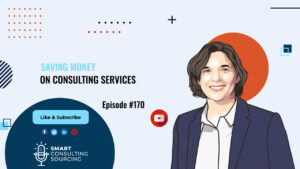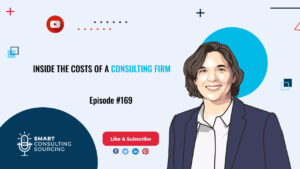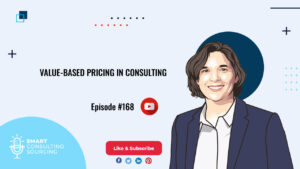Hello and welcome to episode 61 of our podcast: Smart Consulting Sourcing, THE podcast about Consulting Procurement.
My name is Hélène, and I’ll be your host today.
Each week I’ll give you the keys to better use, manage and source consulting services.
This week, I’ll tell you how to qualify a consulting firm for a project
Last week, I explained how to find the right consultants
We saw that your first step is to define what you are looking for. There are several markers that define the “Consulting DNA” of a company: the obvious capability & industry experience, but also the footprint, culture, and delivery model.
But building a list of potential Consulting firms is just the first stage in the process. A Consulting Firm might look like a perfect match on paper, but there is only one way to know if they have the right skills, industry experience, and project experience: talk to them!
Where do you get started to qualify a consulting firm?
So you need to put up a list of potential players. And the size of your project will determine the length of your list. Consider including around fifteen to twenty firms in your first search if you need to find a mid-sized project and compare three prospective suppliers.
When I perform a search, I usually end up with 30% of the firms that don’t have a suitable “Consulting DNA Profile” and 30% that aren’t interested or available for the project as a baseline. When you have finished compiling your first list, you need now to have a closer look at their characteristics to make sure they have the right profile.
Even though numerous consultancy firms claim to have competence in all capabilities in every sector, their track record shows it’s not true. Most of them, often tiny boutiques, specialize in just one capability or sector where they obtain most of their business. So, examine the case studies or previous projects listed on the firm’s website carefully.
Look also at the company’s previous clients: Who are they, and what do they do? The background of the company’s founders is another valuable clue to the company’s primary objective, especially for tiny firms. But, first, take a look at the management team.
In their brochures or websites, most Consulting Firms will state their purpose or methodology. You’ll learn about who they are and how they operate. Are they focusing on high-level Strategy rather than implementation consulting? Are they working more on hard or soft aspects? Are they long-term consultants or former executives with prior corporate experience?
These elements will provide you with an understanding of who these consulting firms are and how they would interact with your organization.
Contact the right partner
Don’t just call any consultant, especially if the consulting firm is rather large. Each Partner comes with a unique set of talents and expertise, which will influence your project.
Consulting organizations are generally divided into industry experience or capabilities (when not both). They may also list the leadership team on their website with their contact information. If not, you should be able to find partners and check out their profiles using LinkedIn.
Thought leadership is also a handy tool. Check for papers or white papers on the subject of your project. The names of the authors and their contact information are often included in the materials.
Make sure they are working for the right firm by checking their present position on LinkedIn. The turnover in consulting is breathtaking; you may be one company behind. After that, you’ll probably add a few consulting firms to your list.
You should now have a list of consulting businesses that appear to have the proper people with the appropriate skills in the right locations. Your next move is to contact them and check their interest and availability face-to-face.
Three factors must be discussed in person: interest, availability, and compatibility. Next, connect with the consulting partners you’ve identified to schedule a call or a meeting after you’ve finished your list.
Here are a few pointers that you can use for these calls:
- Listen to them. They’ll describe what they do and how they accomplish it. You’ll discover more about their culture, methodologies, and area of specialty.
- Examine your list of criteria to verify whether they are a suitable match.
- Avoid giving out too much information about the project. It’s still an exploratory call rather than a briefing, and you haven’t signed an NDA yet. However, you may describe the skills and previous work experience you’re searching for, as well as some information regarding the team in charge of the project.
- Give them insight into the project’s likeliness to be launched and timeframe.
- Give them a general sense of the budget. You don’t have to give a precise number, but you may let them know if you only have a small amount of money or if it’s a major project for your firm.
It is also critical to test your hypotheses and make sure they are interested in the project you want to start. It’s also a good time to see whether they’ll be able to commit and have the bandwidth for the endeavor.
Once you’ve completed that stage, talk with the project’s sponsor and leader to pick which of these businesses you want to include in your RFP.
Check their references
After you’ve chosen a handful of consulting companies and begun the RFP process, the final stage is to verify their references. Don’t be fooled by the big display of logos in the presentations or the case studies on the website, which are both anonymous. Request at least two referrals for the project.
Take the time to contact the references and ask the appropriate questions. You may begin by listing the qualities that are most important to you, such as knowledge transfer, team collaboration, or company impact, for example. Make sure you ask all of your references and consulting firms the same questions. You can add a few customized questions to clarify some grey areas.
Consultants have a high turnover rate, with studies showing that it ranges from 15% to 20%. Partners and consultants move from one consulting firm to the next, get hired by clients, or start their own consultancy. Whole teams are replaced every 4 to 5 years by new talent.
A cutting-edge organization practice gathered brilliant people from all over the world in a top 10 Consulting Firm in 2012. Unfortunately, all the consultants had departed five years later, but the firm maintained the white papers and references in their presentations.
The leadership of your project and the experts involved are crucial aspects of success for a consulting engagement. Request references for the key team members. They must have been actively involved in the projects mentioned.
Make sure the reference is relevant.
First, it must be genuine. Don’t “duh” too quickly; we’ve seen consulting firms send the names of their former employees as references. To verify that they are actual persons and have held relevant jobs, check the reference’s name, position, and background.
Second, it must be on a project with similarities to yours. It may be a project with a comparable context, methodology, or industry. You want to make sure the consulting firm understands how to execute your project.
Third, the reference has to be current—the more recent, the better. Set a time limit (no more than five years is reasonable). The rate of progress in every sector and area has accelerated over the years. A project successfully led fifteen years ago may not tell us much about what would happen today.
You’ll want excellent references from the experts they’ve made a significant contribution to their client’s company. It will also provide you with some data on their performance on the various dimensions crucial in your decision.
If you’ve chosen cultural fit as an important element of your project’s selection criteria, investigate how the consultants interacted with the teams and how they adapted to potential cultural differences.
Don’t accept compromises on the references. If the consulting firm is using confidentiality as a pretext to avoid reference checking, call Consulting Quest, we are a third-party expert and we can verify the credentials for you.
In conclusion
Having a list of consulting firms perfect on paper is not enough to qualify them for a project. You need to find out how real they are. You can’t just “go with your gut” here. A thorough reference check is the only way to determine the performance of a consulting firm.
It’s not easy to find a consulting firm that meets all of your criteria, but it’s well worth the effort! By following this straightforward process, you’ll find the best fit for you and your project.
I spent a little time this week on the importance of checking references. In a way, you will need to get some measure of performance on similar projects. It is not very different from measuring the performance of your own consulting projects. And that’ll be the focus of next week’s episode: how to evaluate the quality of a consultant?
In the meantime, if you have any questions, or want to learn more about what we do at consulting quest, just send me an email at helene.laffitte@consultingquest.com
You can also have a look at our website smartconsultingsourcing.com to know more about our book and download free templates & guides to improve your consulting sourcing.
Bye and see you next week! Au revoir!







